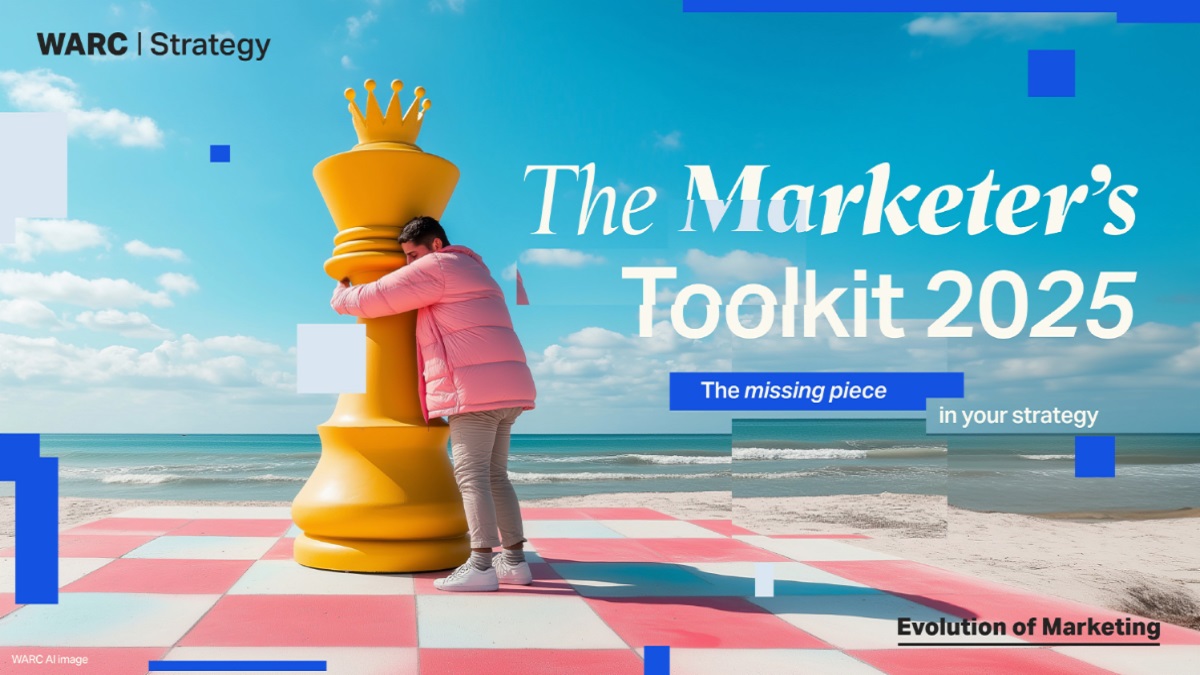WARC releases Marketer’s Toolkit 2025 providing marketers with strategic support for planning and decision-making in the coming year
Based on WARC’s proprietary GEISTE trends research, insights from 1,100+ marketers worldwide and one-to-one interviews with marketing leaders
12 November 2024 – Improving economic conditions, the tension between social media and brand safety, the growing cohort of consumers leading more solo lifestyles, expanding brand building to encompass the entire customer experience, and managing the impact of AI technology on the environment, are five key trends that will shape global marketing strategies in 2025, as revealed in WARC’s Marketer’s Toolkit 2025, released today.
Now in its 14th year, The Marketer’s Toolkit provides marketers with strategic support for planning and decision-making to help navigate the challenges and benefit from the opportunities in the coming year.
The trend identification for the report is based on WARC’s proprietary GEISTE methodology (Government, Economy, Industry, Society, Technology, Environment). It further incorporates a global survey of 1,165 marketing executives, one-to-one interviews with leading marketers worldwide, and analysis and insight from WARC’s global team of experts.
Aditya Kishore, Insight Director, WARC, says: “While rapid growth worldwide is unlikely in 2025, there are reasons to expect more stability than we have had in recent years as central banks regain control over inflation and interest rates decline. WARC is forecasting global ad spend will grow to $1.15 trillion next year.
“Finding the right strategies for this new economic phase is a major theme for the Marketer’s Toolkit 2025, as is expanding perceptions of brand building to encompass the entire customer experience. Marketers will need to carefully identify the areas of opportunity and develop considered strategies to leverage them. We hope this report helps.”
The top five trends outlined in WARC’s Marketer’s Toolkit 2025 are:
Capitalise on the economic reset: Two-thirds (65%) of marketers believe the business environment in 2025 will be better than this year
The marketing industry sees more reason for optimism with two-thirds (65%) of survey respondents for the report believing the business environment in 2025 will be better than it was this year.
As inflation subsides, the global economy enters a new phase, and consumer confidence rebuilds, the challenge for marketers is to shift from communicating price rises and discounting, to building or maintaining pricing power and show why the value of their brands are worth a premium price.
Marketers are advised to use ongoing brand-building to defend pricing strategies, avoid frequent changes in advertising that can confuse consumers and devalue a brand, and become the customer’s voice in the boardroom by influencing the 4Ps – pricing, product, promotion and place.
Close the customer experience gap: $3.7 trillion is at risk as customers cut spending or switch brands after poor experiences
A growing global dissatisfaction with customer service quality is now a critical issue for marketers. The gap between the brand’s promise and the actual customer experience is widening as brands struggle with complex customer journeys, cost-cutting, and margin pressures. A staggering $3.7 trillion is at risk as customers cut spending or switch brands after poor experiences.
According to the Marketer’s Toolkit survey, the majority of brand marketers directly manage just two elements of customer experience: website and/or app design and measuring customer satisfaction.
Brands are recommended to adapt strategies to better align customer promise and experience, boost memorability and distinctiveness at critical customer touchpoints (apps, websites, retail outlets), and constantly test, learn and listen to feedback.
Andrea Sengara, Head of Marketing, US, Campari Group, says: “A key part for me is getting input and feedback from everyone across the organization […] From people’s experiences in-store and at bars and restaurants to customer experiences trying the product, this can all help us improve how we are building the brand.”
The digital dilemma: 40% of advertisers expect brand safety to have a “significant impact” on their marketing strategies in the coming 12 months but only 8% plan to reduce their investment in social media
Despite enduring concerns about the prevalence of hate speech and misinformation, Big Tech platforms are perceived as indispensable to many brands’ marketing plans, claiming a greater share of ad budgets. Alphabet, Amazon and Meta are forecast by WARC Media to account for 44% of all global ad spend this year.
40% of Toolkit survey respondents expect brand safety to have a “significant impact” on their marketing strategy in the coming 12 months, up 10 percentage points in three years, yet only 8% plan to reduce or cut their investment in social media. Concerns continue around the open web, the rise of AI-generated made-for-advertising (MFA) websites and the more than $80bn in global spend lost annually to ad fraud, per Jupiter Research.
Industry initiatives to improve conditions have proven unsuccessful, so it falls on brands to take a more active role in managing the places in which their ads are showing up. The growing abundance of media choices present more opportunities for brands to rely less on the triopoly. Media planning is evolving to help marketers capitalise on, and mitigate the risk of, digital platforms’ AI-powered campaign management tools.
AI meets sustainability: Less than a third (32 %) of marketers see AI sustainability concerns influencing media buying in 2025
Artificial intelligence (AI) is revolutionising the advertising industry. But the exponential promise of this technology is matched by its insatiable energy use.
Research has shown generating one image with a powerful AI model uses as much energy as charging a smartphone – between 5g and 10g of CO2 emissions. A typical campaign generates the same emissions as seven people do per year.
However, few marketers are engaged with looking at the intersection of AI, media buying and sustainability. Less than a third (32%) of Toolkit survey respondents thought AI sustainability concerns were likely to influence their media buying in 2025.
It is critical for brands and agencies to build sustainability into their AI plans. Media buyers can set the template for others to follow through building thorough sustainability frameworks to guide their work. Industry-wide collaboration will be vital to making sure the planetary impact of AI’s use in advertising can be monitored in consistent, scalable ways.
The age of atomisation: 68% of marketers are not addressing the market opportunity offered by consumers living solitary lives
The number of people living alone has grown steadily over the past few decades. In 2023, there were an estimated 484 million single-person households globally, accounting for one-fifth of all households worldwide. They are expected to grow by 48% by 2040, outpacing the growth rate of all other household types. Living more solitary lifestyles, these consumers are becoming increasingly ‘atomised’ as they shop, dine, and entertain themselves on their own.
However, relatively few marketers appear to be targeting products or services to this segment, or even communicating with the right emotional resonance to help connect with this audience.
Brands have a real opportunity to target this audience with products and services that cater to their specific needs and reduce the single-person ‘penalty’ to make them feel valued.
A complimentary sample of The Marketer’s Toolkit 2025 is available to read here.
The Marketer’s Toolkit 2025 is part of WARC Strategy’s The Evolution of Marketing programme, offering a series of practical reports designed to help marketers address major industry shifts to drive marketing effectiveness in the coming year.
A series of podcasts, reports and events will follow on The Marketer’s Toolkit 2025.
Complementing this Marketer’s Toolkit 2025 global report are the GEISTE report, and the upcoming The Voice of the Marketer (December) and The Future of Media (January).


 Business4 days ago
Business4 days ago
 Events5 days ago
Events5 days ago
 Energy5 days ago
Energy5 days ago
 Energy3 days ago
Energy3 days ago
 Events4 days ago
Events4 days ago
 Business4 days ago
Business4 days ago
 Business3 days ago
Business3 days ago
 Business3 days ago
Business3 days ago













